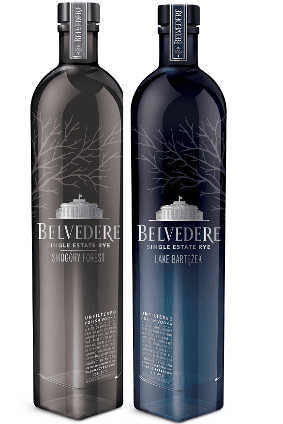Terroir vodkas - legit or snakeoil
Contributed by on Jul 26, 2018
Zero readers love this post.
 I have found some new products, which let me thought over the whole concept of terroir of spirits.
I have found some new products, which let me thought over the whole concept of terroir of spirits.Belvedere released two unique vodkas which are made with rye out of two specific micro-regions. Please check the link, because I won’t run with the typical marketing b.s.
The issue here is: does it make sense or is it total nonsense?
We probably have first to make some important distinction, what means and what influences terroir.
terroir | terˈwär | nounthe complete natural environment in which a particular wine is produced, including factors such as the soil, topography, and climate. • (also goût de terroir | ɡo͞o də | ) the characteristic taste and flavor imparted to a wine by the environment in which it is produced. ORIGIN French, ‘land’, from medieval Latin terratorium.Terroir (as well as unique sub-varieties) in directly consumed items is a non-brainer. And wine is known to rely on terroir (I am doubting, that terroir is really as important as most people say - it is quite a lot of perception. But yeah - terroir has an influence).
But when it comes to spirit it becomes... complicated. There is the typical style for a specific regional focused spirit: e.g. the short, narrow & fat pot stills of Islay malts - and the characteristic use of peated barley malt. And there are definitely other regional influences a spirit can take - the hot summers and cold winters of Kentucky bourbons or the Island warehouses in Scotland, which are continuously “washed” with sea air. These things have for sure a rather recognizable influence in the taste of the respective spirit. More ambiguous are Cognacs which are made with unique grapes (e.g. Folle blanche instead of Ugne blanc). There is a slight difference - but the question is, how much is it the blenders craft to “tickle out” the difference - and how much is it really the unique grape characters.
But then there is vodka. I guess, the only difference is that this terroir Belvedere’s are based on a ferment of the unique rye varieties. The still is the same. The fermentation will be pretty much the same. And it is vodka, which is distilled in a patent still to at least 96% abv - even though, the vodkas are not filtered, they are still highly rectified.Are there differences? I didn’t tried the vodkas, but yes - I am sure that there are differences. However they will be still in the tight boundaries of common perception.Look, I am not against new products and against the widening of contemporary product categories - and I am not slashing those Belvedere’s vodkas here completely. But I still don’t get, why Belvedere is not producing a flavored vodka, which is more artisan. For example using roasted rye (and for example a bit of caraway, which perfectly accentuates rye) to flavor their vodka. This would definitely add a big differentiation to the normal vodkas - and would give us bartenders more room to play... a really “rye’y Bloody Mary - or a vodka caraway sour, would be definitely some unique drinks, which would benefit out of this direction (by the way, I still didn’t understood Belvedere’s idea to make a Bloody Mary flavored vodka - if a Bloody Mary would lack any “Bloody Mary flavors” - tztztz...
Well - having said this, I probably have to do it myself. Will come back soon with the results :)





